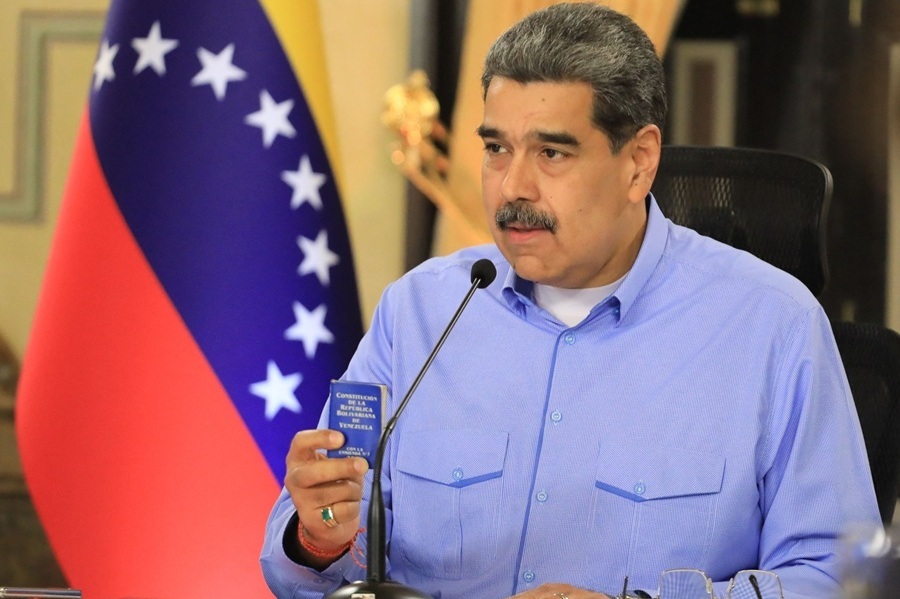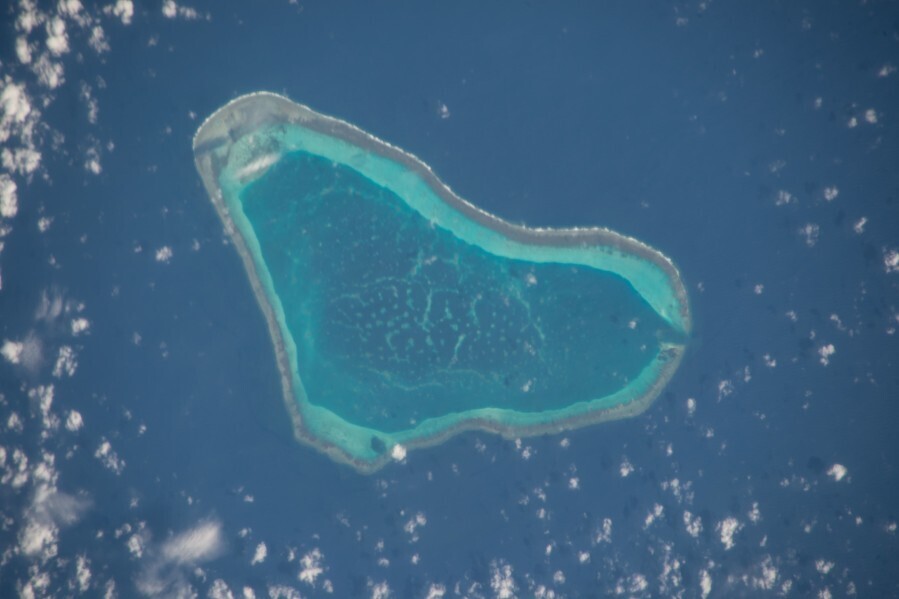China's Saudi-Iran deal only a defensive response to Western security challenges
Academic Ma Haiyun explains how the Saudi-Iran detente is the experiment and application of China's GSI with a focus on national and regime security, when Saudi Arabia, Iran and China have been facing increasing security challenges from the US and the West.
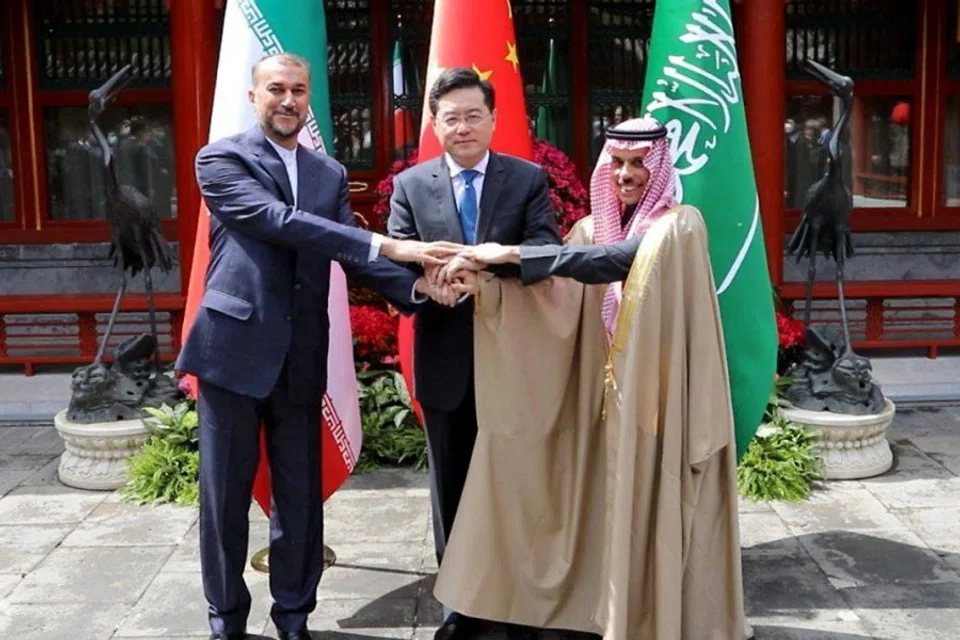
The recent Chinese-brokered peace deal between two major Middle Eastern rivals, Saudi Arabia and Iran, has sparked heated discussions between global competitors China and the US.
To the Chinese, this is a major diplomatic achievement contrasting China's sense of responsibility and contribution to regional peace with US-initiated wars and invasions, especially in the Islamic world.
The new rapprochement between the two Gulf countries can be seen as the fourth friendly phase following the third friendly phase after the first Gulf war...
Reviving historical agreements in the fourth friendly phase
The agreement between Saudi Arabia and Iran announced the resumption of diplomatic relations between the two countries, affirmation of the respect for the sovereignty of states and the non-interference in internal affairs of states, and implementation of the Security Cooperation Agreement signed in 2001 and the General Agreement for Cooperation reached in 1998.
Several attempts have been made to achieve peace after conflicts between Saudi Arabia and Iran since the Islamic Revolution in 1979 and the Gulf War in 1991. The new rapprochement between the two Gulf countries can be seen as the fourth friendly phase following the third friendly phase after the first Gulf war - when Saudi Arabia and Iran signed a deal in 1998 to bolster economic, cultural, and technological cooperation - and the result of the immediate threat of Iraq to Saudi Arabia and the US-Iran tensions.
The hard core of the relationship between Saudi Arabia and Iran is security. The recent Iranian negotiator in Beijing, Ali Shamkhani, is an ethnic Arab who had long advocated security cooperation with Saudi Arabia since 2000, and even proposed to create a joint army for the defence of the Muslim world.
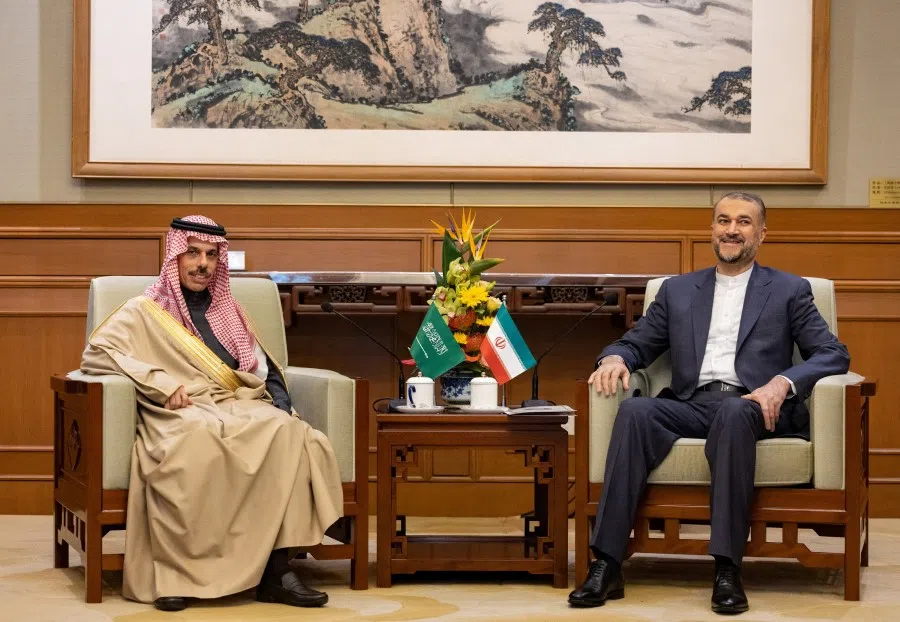
Military cooperation between the two countries has not materialised. However, the two countries signed another agreement in 2001 on internal security cooperation. The agreement covered fighting organised crime, terrorism and drug trafficking. According to Ali-Asghar Khaji, Iran's ambassador to Saudi Arabia, this is the most important development in the history of relations between the two countries.
The implementation of the security agreement between the two countries, however, has been delayed for two decades. Against that backdrop, the joint statement in Beijing in early 2023 about the new normalisation deal is to activate the 1998 and 2001 agreements under the new national, regional and international security contexts.
Saudi Arabia is losing US backing in its regional competition against Shia Iran in Yemen.
Strained Saudi-US relations
For Saudi Arabia, the devastating war in Yemen since 2015 has not only turned into a costly quagmire, but also invited aerial warfare from the Houthis. The sectarian war mainly between Saudi-headed Sunnis and Iran-backed Shia has even developed into a geopolitical rift between Saudi Arabia and the United Arab Emirates in Yemen and elsewhere.
Internationally, the Saudi-led airstrikes in Yemen have been called war crimes. And the Biden administration in 2021, announced an end to US military support for Saudi's "offensive operations" and suspended some munitions sales, which made Saudi's military operations in Yemen difficult, unwinnable and even unthinkable.
The murder of Jamal Khashoggi, and US responses to Saudi Crown Prince Mohammad bin Salman (MBS), as well as Saudi Arabia's oil cut following the Russian-Ukrainian war, have also added fuel to the fire in Biden-Salman relations.
In addition, the Biden administration's Summit for Democracy excludes Saudi Arabia. It not only distances US-Saudi relations, which is bound by oil pegged in dollars in exchange for US security guarantee, but also ideologically challenges the kingdom's security. Thus, Saudi Arabia is losing US backing in its regional competition against Shia Iran in Yemen.
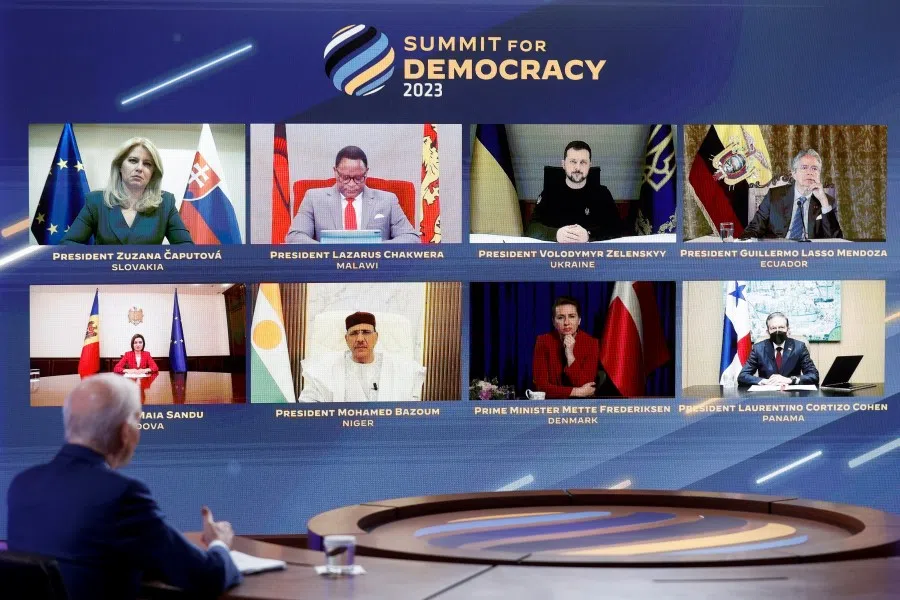
The new perceived threats by Saudi and other Arab monarchies have also expanded to include the Muslim Brotherhood and other "Islamists", including the likes of Jamal Khashoggi and Humza Yousaf, the first minister of Scotland whose values and ideologies are more in line with Western democracies.
Shift of focus to domestic regime security
The new dynamics in the Saudi-US relationship, and the new perceived threats to the Saudi monarchy, have led to realistic foreign policy that refrains and even shifts from regional and sectarian competition to that of domestic regime security.
The same is true of Iran. Iran's relations with the US and Israel have long been antagonistic, as the US has backed and armed the Israeli occupation of Palestinian territories. Donald Trump's presidential win in 2017, and his subsequent appointment of his Jewish son-in-law Jared Kushner as senior adviser, pushed the US towards taking unprecedented pro-Israeli and provocative policy against Iran.
Deeply trapped in quagmires in Yemen and Syria and facing pressure from the US and the West, Saudi Arabia and Iran were exhausted from the decade-long competition and returned to the negotiation table.
Economically, the Trump administration's "maximum pressure" on Iran has cut off Iran's access to billions of dollars in oil revenue while the sanctions on Iran target more than 80% of the country's economy. Militarily, the Trump administration assassinated General Qasem Soleimani, the Iranian commander of the Quds Force in Baghdad in 2020. Diplomatically, Jared Kushner brokered the Abraham Accords establishing a Middle East bulwark against Iran.
The 2022 Iran demonstrations led mainly by Iranian women were directly targeting the Iranian regime with chants of "death to the dictator". The recent Iranian drone sale to Russia has further isolated Iran and enlarged Western sanctions. All these sanctions, assassinations and isolations have not only thwarted Iranian regional ambition and operationality, but also directly threatened domestic regime security.
Deeply trapped in quagmires in Yemen and Syria and facing pressure from the US and the West, Saudi Arabia and Iran were exhausted from the decade-long competition and returned to the negotiation table.
Foe to friend
Since April 2021, the two countries have held several rounds of direct talks in Baghdad.
Four months later, the newly elected Iranian President Ebrahim Raisi reframed Iranian foreign policies, shifting from regional and sectarian competition (with Saudi Arabia as well as Turkey) to neighbourhood security cooperation. At his inauguration, Raisi said that he would extend a hand of friendship and brotherhood to all countries in the region, especially neighbours.
Three weeks later, Raisi's foreign minister, Hossein Amir-Abdollahian, attended the Baghdad Conference for Cooperation and Partnership together with the foreign ministers of Saudi Arabia and UAE. The Iranian foreign minister elaborated and reaffirmed Raisi's policy, saying that security will only be achieved through mutual trust, reliance on national capabilities, strengthening relations and good neighbourliness, as well as through the non-intervention of extra-regional governments.
In other words, both countries began to retreat from sectarianism, expansionism and interventionism and to focus on national sovereignty, regime security and economic development.
Finding another friend in China
Like Saudi Arabia and Iran, China's relations with the US and the West have been quickly deteriorating. The rise of China, and the domestic political challenges in both the US and China, have led to a shift in the US's grand strategies. From Obama's pivot to Asia to Trump's Indo-Pacific strategy, and by signing the Doha agreement to exit Afghanistan, the US has steadfastly returned to great power rivalry.
With the development of social media and the rise of populism in the US and China, emotional rhetorics such as Make America Great Again (MAGA), and the rejuvenation of the Chinese nation or the Chinese Dream have gained ground, exacerbating US-China tensions. Talks of destructive decoupling have escalated to possible military conflicts, especially over Taiwan and the South China Sea.
Democracy vs authoritarianism in the context of great power competition clearly points to the Chinese ruling party as well as to the monarch of Saudi Arabia and the ruling clergy of Iran.
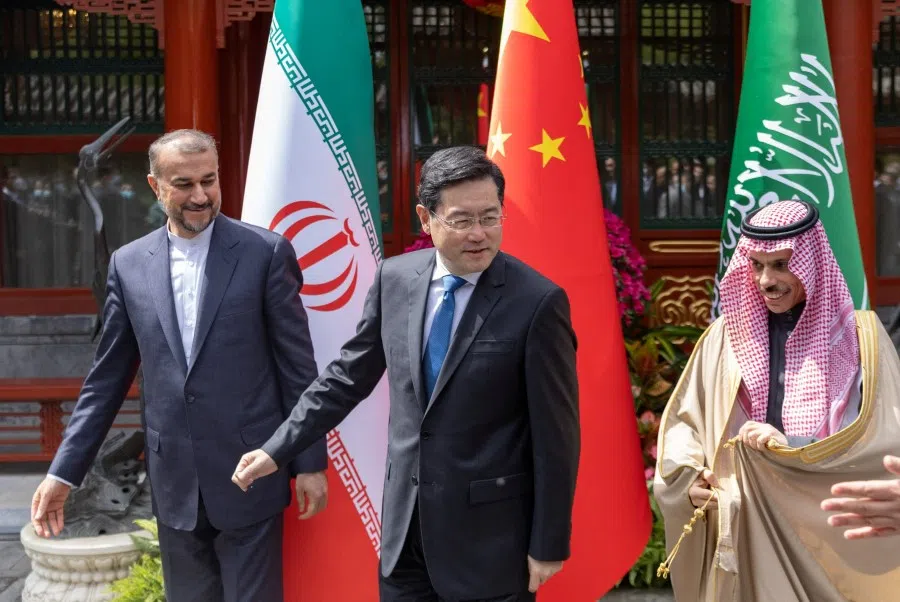
Great power competition has unavoidably developed into a dichotomy between democracy and authoritarianism.
The Biden administration has prioritised democracy in its foreign policy partly due to the domestic political violence represented by the Jan 6 Capitol attack. It has convened democracy summits and has vowed to renew and strengthen democracy in the US and around the world to promote respect for human rights and fight against authoritarianism. The Xinjiang issue (among China's domestic issues) and the "no limits" partnership between China and Russia have provided justification for Biden's actions and even legitimised them.
Democracy vs authoritarianism in the context of great power competition clearly points to the Chinese ruling party as well as to the monarch of Saudi Arabia and the ruling clergy of Iran. Although such an idea is not as radical as former US Secretary of State Mike Pompeo's suggestion, urging the Chinese to change their ruling party, the Biden administration's values-based foreign policy presents a great challenge to the Chinese Communist Party, Chinese systems and institutions and also the Chinese state-owned enterprises.
China moving towards security-linked forums and initiatives
Moreover, the increasing US arms sales to Taiwan, consolidation of the US-Japan-South Korean alliance, renewed military bases in the Philippines, and the formation of the Quadrilateral Security Dialogue (Quad) and AUKUS plus France, have together forced China to focus on security-linked forums and initiatives.
One such security forum targets the Middle East where the US has infamously armed and financed Israel against Iran and deterred Arab states. In 2019, the China Institute of International Studies (CIIS) organised the first "Middle East Security Forum, Security in the Middle East under the New Situation: Challenges and Prospects", to implement Xi Jinping's speech on promoting Sino-Arab strategic partnership which he had made in the previous year.
Two years after the launch of the above-mentioned forum, China's Foreign Minister Wang Yi proposed a five-point initiative calling for the building of collective security in the Middle East. The following year, Xi launched the Global Security Initiative (GSI), extending the security initiative from the Middle East to the global stage.
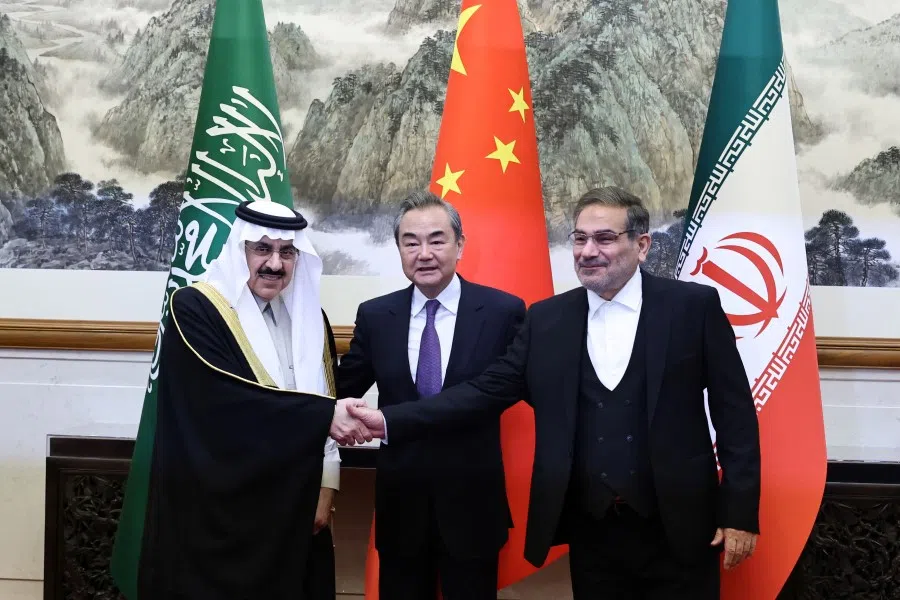
The core of the GSI comprises "six commitments" that highlight respecting the sovereignty and territorial integrity of all countries, abiding by the purposes and principles of the UN Charter, and peacefully resolving differences and disputes between countries through dialogue and consultation.
The "six commitments" to some extent resembles the "five principles of peaceful coexistence" that then Chinese Premier Zhou Enlai put forward in 1953, which includes mutual respect for sovereignty and territorial integrity, mutual non-aggression, non-interference in each other's internal affairs, and peaceful coexistence.
The five principles were late adopted by Indonesia in the Ten Principles during the Asian-African Conference in Bandung in 1955, and were included by the UN General Assembly in its Declaration on Principles of International Law concerning Friendly Relations and Co-operation among States in accordance with the Charter of the United Nations in 1970.
... the Saudi-Iran detente is the experiment and application of China's GSI with a focus on national and regime security, when Saudi Arabia, Iran and China have been facing increasing security challenges from the US and the West.
Defensive more than offensive
Similar to and consistent with the above, the recent China-mediated Saudi-Iran rapprochement highlights adhering to the principles and objectives of the Charters of the United Nations and the Organization of Islamic Cooperation (OIC) and international conventions and norms.
The Islamic republic and the Gulf kingdom affirmed their respect for the "sovereignty of states" and "non-interference in internal affairs". In other words, the Saudi-Iran detente is the experiment and application of China's GSI with a focus on national and regime security, when Saudi Arabia, Iran and China have been facing increasing security challenges from the US and the West.
It is clear that reinforcing the "sovereignty of states" and the "non-interference in internal affairs" is more defensive than offensive. It will also not change the existing security framework of the West. Neither will it build a new order in the Middle East nor will it push an alternative to Western-led global security, even if the GSI is successfully implemented in the Middle East or elsewhere. It is at best a wedge in the US-led order to maintain national and regime security in non-West countries.
Related: Chinese academic: Beijing does not want China to replace the US in the Middle East | Chinese academic: Can China challenge the US's standing in the Middle East? | Will China become an 'empire by invitation' in the Middle East? | Differences between the US and China in Middle East peace advocacy | Saudi-Iran deal: Diplomacy with Chinese characteristics gaining ground | Saudi-Iran deal: China's Global Security Initiative is working


